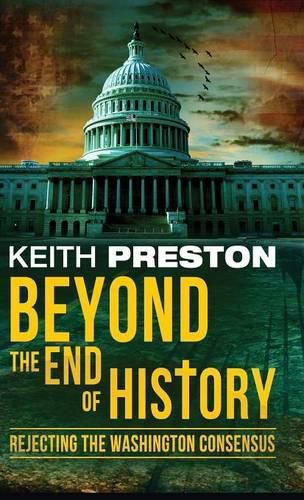Readings Newsletter
Become a Readings Member to make your shopping experience even easier.
Sign in or sign up for free!
You’re not far away from qualifying for FREE standard shipping within Australia
You’ve qualified for FREE standard shipping within Australia
The cart is loading…






This title is printed to order. This book may have been self-published. If so, we cannot guarantee the quality of the content. In the main most books will have gone through the editing process however some may not. We therefore suggest that you be aware of this before ordering this book. If in doubt check either the author or publisher’s details as we are unable to accept any returns unless they are faulty. Please contact us if you have any questions.
In the quarter century that has passed since the collapse of the Soviet Union and the end of the Cold War, fanciful establishment intellectuals have advanced the idea that an end of history has somehow arrived. The model of democratic capitalism is said to be the final stage in the development of political economy. It is often suggested that it is simply a matter of waiting for the rest of the world to catch up, and at that point the Western model will have achieved a final and eternal triumph.
In this work, the anarchist philosopher Keith Preston expresses skepticism of these presumptions. Expounding upon the critique of modernity advanced by Friedrich Nietzsche well over a century ago, Preston argues that the historical cycle associated with the rise of modernity is winding down.
The forces of globalism, liberalism, capitalism, democracy, and Americanization are closer to achieving universal hegemony than ever before. Yet Preston subjects all of these to relentless criticism, and challenges virtually every presumption of the present era’s dominant ideological model.
Drawing upon a wide range of ideological currents and intellectual influences, Preston observes how the hegemony of what he calls the Anglo-American-Zionist-Wahhabist axis is being challenged within the realm of international relations by both emerging blocks of rival states and insurgent non-state actors. Citing thinkers as diverse as Ernst Junger and Emma Goldman, Max Stirner and Alain de Benoist, Hans Hermann Hoppe and Kevin Carson, Preston offers an alternative vision of what the future of postmodern civilization might bring.
$9.00 standard shipping within Australia
FREE standard shipping within Australia for orders over $100.00
Express & International shipping calculated at checkout
This title is printed to order. This book may have been self-published. If so, we cannot guarantee the quality of the content. In the main most books will have gone through the editing process however some may not. We therefore suggest that you be aware of this before ordering this book. If in doubt check either the author or publisher’s details as we are unable to accept any returns unless they are faulty. Please contact us if you have any questions.
In the quarter century that has passed since the collapse of the Soviet Union and the end of the Cold War, fanciful establishment intellectuals have advanced the idea that an end of history has somehow arrived. The model of democratic capitalism is said to be the final stage in the development of political economy. It is often suggested that it is simply a matter of waiting for the rest of the world to catch up, and at that point the Western model will have achieved a final and eternal triumph.
In this work, the anarchist philosopher Keith Preston expresses skepticism of these presumptions. Expounding upon the critique of modernity advanced by Friedrich Nietzsche well over a century ago, Preston argues that the historical cycle associated with the rise of modernity is winding down.
The forces of globalism, liberalism, capitalism, democracy, and Americanization are closer to achieving universal hegemony than ever before. Yet Preston subjects all of these to relentless criticism, and challenges virtually every presumption of the present era’s dominant ideological model.
Drawing upon a wide range of ideological currents and intellectual influences, Preston observes how the hegemony of what he calls the Anglo-American-Zionist-Wahhabist axis is being challenged within the realm of international relations by both emerging blocks of rival states and insurgent non-state actors. Citing thinkers as diverse as Ernst Junger and Emma Goldman, Max Stirner and Alain de Benoist, Hans Hermann Hoppe and Kevin Carson, Preston offers an alternative vision of what the future of postmodern civilization might bring.